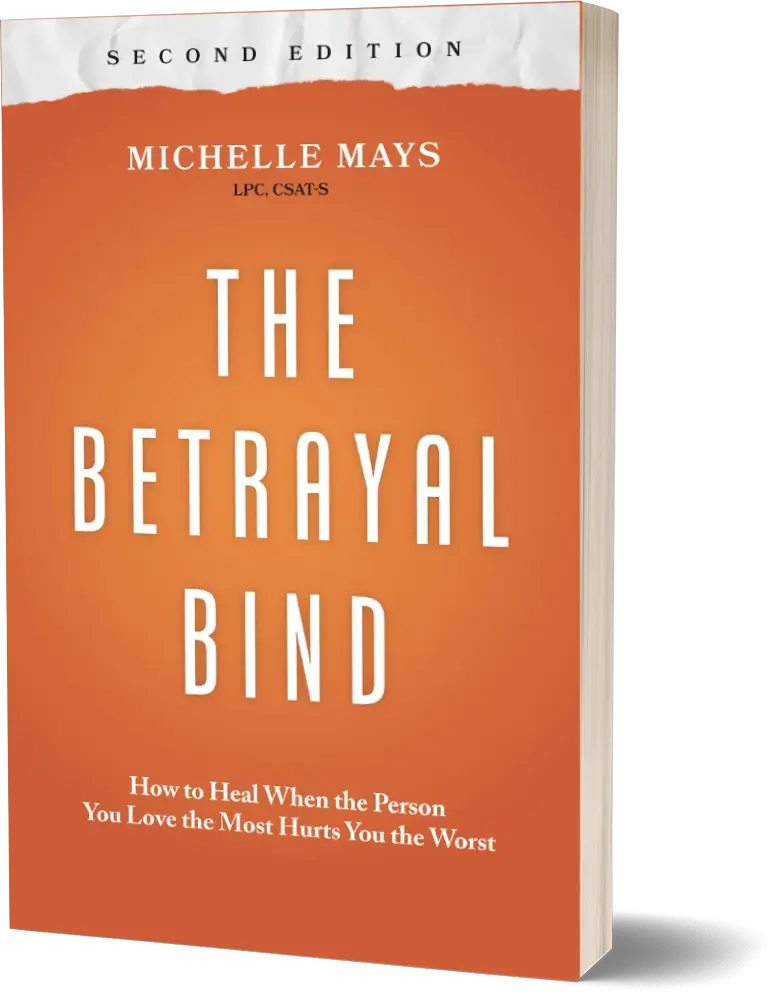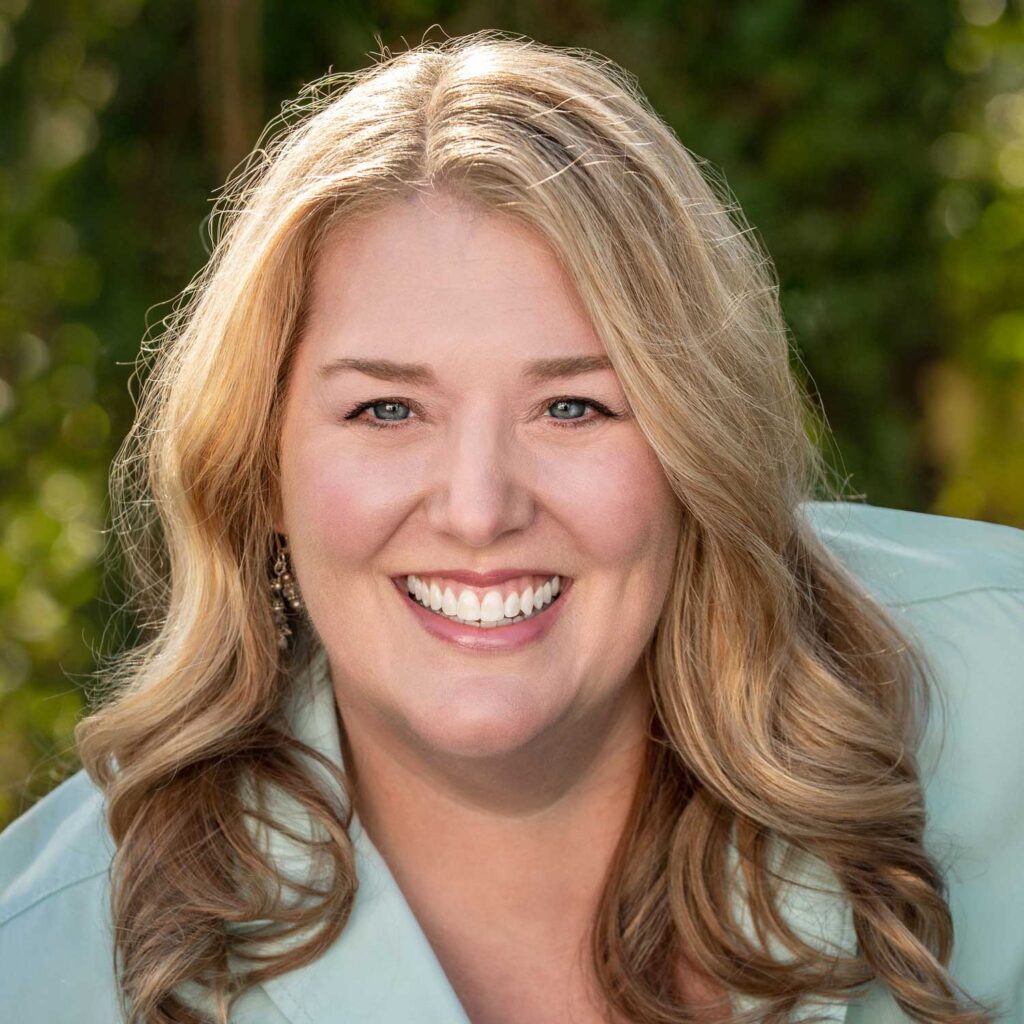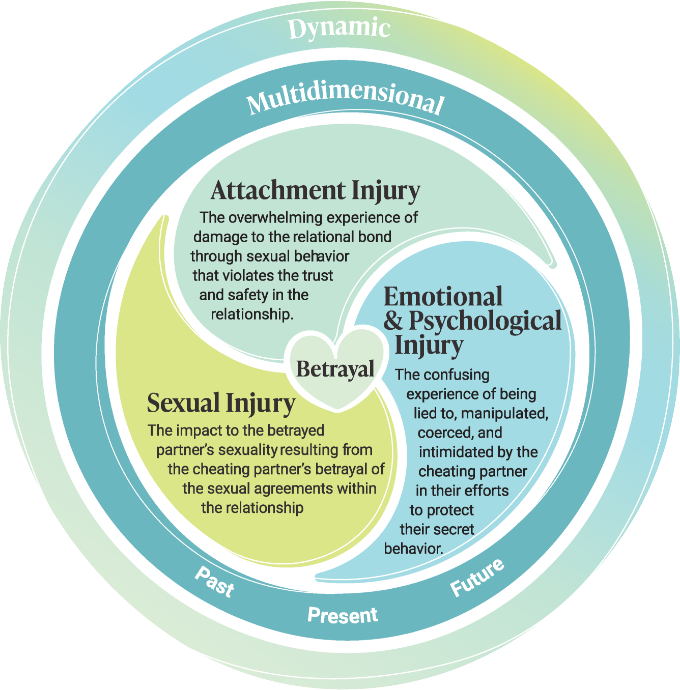
The Betrayal Bind
Second Edition
How to Heal When the Person You Love the Most Hurts You the Worst
Michelle Mays’ new book introduces language, concepts, and imagery to explore the crucial relational dilemma that betrayed partners face when their significant other is unsafe to connect to, yet connection is the key to healing.
Meet Michelle

Michelle Mays LPC, CSAT-S
Michelle Mays is a Licensed Professional Counselor and expert in treating sexual betrayal and trauma. She’s also the author of the new book The Betrayal Bind: How to Heal When the Person You Love the Most Has Hurt You the Worst. Michelle has created a new treatment model to address the devastating dilemma that betrayed partners face when their significant other is unsafe to connect to, yet connection is the key to healing.
The Braving Model™: Attachment-Focused Hope for Partner Betrayal
What happens when your partner, your lover, your primary person cheats on you and, in an instant, becomes a source of danger, pain, and threat? The Braving Model™ is rooted in research examining the nature and role of betrayal in traumatic experiences. Betrayal creates immediate relational disconnection. This attachment-based experience of disconnection lies at the root of all the symptomatic behaviors that betrayed partners display in the aftermath of betrayal.

Michelle is truly gifted at walking partners through betrayal trauma. She equips partners with information, insight, tools and skills to successfully walk through pain and come out empowered and strong. Her direct yet compassionate and non-judgmental approach create a healing space of safety, authenticity, and connection, where powerful transformation takes place.
I’m only halfway through this program but it has already had a huge impact in my life. I’ve learned how I’m keeping myself stuck and how to start moving forward. Small steps, but these have led to big changes in how I feel about myself everyday and how I feel about my wife and our relationship. I’m so grateful to have found this program.
Michelle's knowledge of betrayal trauma, sexual addiction, and healing from both is impressively vast and invaluably useful. Her ability to articulate, analyze, and validate my experience is incredibly eye opening.
Michelle is a wealth of knowledge, understanding, compassion and insight. She patiently, realistically and authentically helps partners walk through and out of betrayal with healing, hope, and renewal. I’m very grateful for her and the work she is doing.
Michelle's approach is gentle and she provides excellent comprehensive information in a holistic way to help you heal from what has happened to you as a betrayed partner.
The Authentic Hope Blog
Partner Betrayal Trauma: The Basics
I wish that when I was going through the many rounds of betrayal I experienced that I knew then what I know today. At the time I did not understand the science and theory behind the way that we pair-bond and what happens when that attachment is damaged. I only knew that discovering sexual betrayal in my relationship changed me overnight.
The Braving Hope® Process
One of my favorite moments as a therapist is when a new client comes into my office and tells me their betrayal story. As I listen, I begin to see in my mind’s eye the way in which this person’s life will change, the freedom they will encounter, how much better their relationships will be and how good they will begin to feel in their own skin if they will enter into the transformation process.
Partner Betrayal & Attachment Ambivalence
A concept coined by Michelle Mays, attachment ambivalence is the relational dilemma that occurs when betrayed partner’s fear and attachment systems fire simultaneously in response to the threat of betrayal but with opposite safety imperatives. Our attachment systems tells us to move toward the cheating partner to reconnect to find safety. At the same time, our threat response system tells us to move away and seek safety through distance. This creates chaotic and complex relational dynamics in the aftermath of betrayal.
The 5-Step Strategy to Take Back Your Life after Betrayal
In this FREE masterclass you’ll discover…
- A step-by-step game-plan to heal sexual betrayal, restore self-esteem and reclaim your life even if you currently feel stuck, paralyzed and overwhelmed with pain.
- How to effectively communicate your pain to your partner even if your partner is telling you to ‘just move on and get past it’.
- How to refuse to carry the shame of betrayal and to restore self-esteem in order to move forward with self-confidence and purpose.
- Why false hope is worse than no hope at all, and how you can ground your healing in authentic hope that creates real change.

















